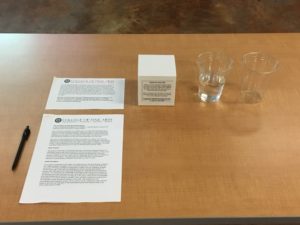Megan Beerse’s Art Therapy Masters Thesis Defense
 Art Therapy student Megan E. Beerse successfully completed her defense of her masters thesis, titled Is there a biofeedback response to art therapy? A multidisciplinary approach for reducing anxiety and stress in college level students. The defense took place on June 29th, 2018.
Art Therapy student Megan E. Beerse successfully completed her defense of her masters thesis, titled Is there a biofeedback response to art therapy? A multidisciplinary approach for reducing anxiety and stress in college level students. The defense took place on June 29th, 2018.
Beerse’s masters thesis explored the biofeedback response to mindfulness-based art therapy facilitated over an online platform. The abstract for her thesis provides further details, including an introduction of research results and implications:
Most quantitative research on art therapy and stress is organized in either pretest-posttest single sessions or multi-week, rigorous art therapy interventions. Researchers have failed to address an intervention strategy that meets in the middle, a strategy that emphasizes mental health as a habitual practice. Mindfulness and art therapy independently demonstrate efficacy in reducing stress and symptoms of anxiety with higher-education students, but again, these interventions require a substantial time commitment that many students will not make. To address the mental health crisis on college campuses, this study evaluated the feasibility of a minimal contact, technology-assisted Mindfulness-Based Art Therapy (MBAT) intervention for higher-level education students over the course of ten weeks. The experimental MBAT group was compared to a neutral clay task (NCT) comparison group. Self-report outcomes were collected on perceived stress and levels of generalized anxiety. Salivary cortisol sampling was conducted on the first and last weeks of the study to determine any presence of a physiological impact on participants. Fifteen participants were recruited and nine maintained participation through all 10 weeks. Reduced symptoms of generalized anxiety were observed in the MBAT condition but not the NCT condition. MBAT participants’ salivary cortisol concentrations significantly decreased pretest to posttest on Week 10 but not on the first week, while the NCT participants experienced the opposite. Further data is needed, but results suggest the possibility of a biofeedback response to art therapy as well as anxiety-reducing benefits from practicing mindfulness-based art therapy directives in the form of a minimal contact, technology-assisted approach.
 In the following statement, Beerse responded to her experience and explains future endeavors related to her research:
In the following statement, Beerse responded to her experience and explains future endeavors related to her research:
My thesis experience was equally remarkable and challenging. I got the rare opportunity to collaborate with researchers from the Department of Biomedical Sciences, which has expanded my understanding of academia and research strategies. I am excited to say that my thesis has also shaped the start of my career, as I now get to facilitate a second cycle of the pilot intervention on a larger scale, and hope it propels future investigation into proactive mental health strategies using a multidisciplinary approach.
The Department cordially congratulates Megan Beerse for her exceptional achievement and wishes much success in the second cycle of her research!